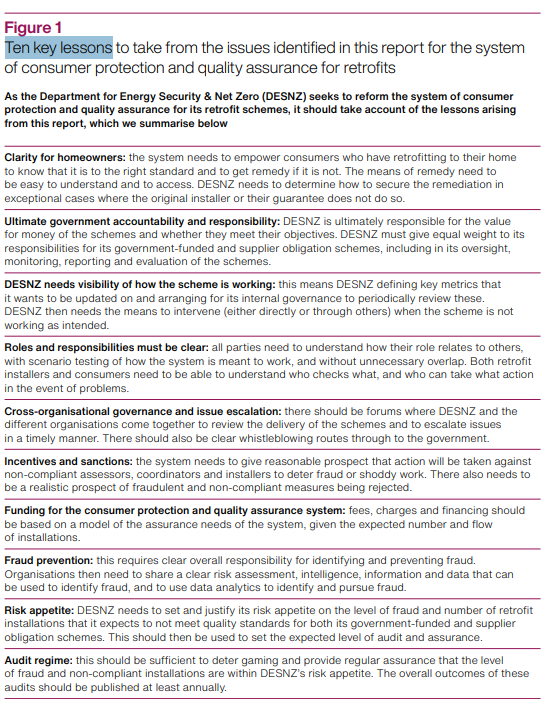Overly complex design, weak government oversight and unclear and fragmented responsibilities led to “serious and systemic failures” in the last government’s domestic energy efficiency scheme, the National Audit Office has found.
Almost all external insulation fitted under the Conservative government’s Energy Company Obligation scheme requires work to correct major issues that will cause problems such as damp and mould, the watchdog's latest report reveals.
The scheme, introduced in 2021 – under Boris Johnson’s administration – aimed to tackle fuel poverty and reduce carbon emissions by requiring energy companies to fund the installation of energy efficiency measures, such as insulation, in homes.
But poor installation work means 98% of the external wall insulation and 29% of internal insulation fitted under the scheme has major issues that need fixing, according to audits commissioned by the Department for Energy Security and Net Zero and energy regulator Ofgem. DESNZ and Ofgem believe this means external insulation work carried out in between 22,000 and 23,000 homes needs to be repaired or replaced, while between 9,000 and 13,000 homes require remediation for internal works.
The NAO report said DESNZ’s consumer protection system for the scheme was set up in 2021 but did not alert the department to significant issues with the quality of installations until late 2024. The department is responsible for the design of the scheme, while Ofgem is responsible for its administration. DESNZ has carried out root-cause analysis to understand why the issues were not identified sooner.
The audits the department commissioned found that DESNZ had “limited oversight” of the scheme, designing the consumer protection and quality assurance system to operate at arm’s length from government.
They also found that DESNZ “did not fully use the levers it did have”, with “limited senior leader attention on ECO, gaps in its internal governance, poor risk management and insufficient in-house technical expertise”, leading senior leaders “to assume the system was working”.
The root-cause analysis also found that the government created an “overly complex system that ultimately failed”, with “unclear and fragmented roles, responsibilities and accountabilities” among DESNZ, Ofgem and the other organisations involved in delivering the scheme.
These roles “were not properly understood by all stakeholders, with poor process mapping and scenario planning”, the NAO report says. There was also “no meaningful cross‑organisational governance, and information sharing between organisations was poor”, making “identification and escalation of risks more difficult”.
The NAO said that “other domestic retrofit measures and schemes can occasionally fail to meet quality standards, but DESNZ believes they do not have the same serious and systemic failures" as the ECO schemes: ECO4 and GBIS.
The NAO also pointed to weaknesses in DESNZ’s approach to fraud, picking out three weaknesses:
- Inherent risks in the scheme design and its operation
- The department’s failure to carry out a fraud risk assessment during the design of the scheme and to assign responsibility for managing specific fraud risks
- Ofgem relies on others to detect and report fraud, but the other organisations have no requirement to look for it and poor information sharing hinders their ability to do so.
While there are suspicions of fraud in ECO, the overall level is unknown. However, Ofgem has estimated that retrofit businesses falsified claims for ECO installations in between 5,600 and 16,500 homes to potentially claim between £56m and £165m from energy suppliers. There are separate suspicions of fraudulent claims on installations in homes and for households that are not eligible.
The report also noted that when DESNZ and Ofgem became aware of the issues with the schemes, they responded quickly, and that DESNZ has been "very keen to identify what went wrong, to learn lessons and to understand how to improve the system". But the NAO said the current system "left it with few levers and limited information".
The report recommends that DESNZ should:
- Take clear responsibility for schemes such as ECO, even when they are funded through consumers’ electricity bills
- Clarify its approach to repairing faulty ECO scheme installations alongside its Warm Homes Plan
- Reform the consumer protection system for retrofit schemes
- Report annually on a statistically robust estimate of the level of fraud and non-compliance in each of its retrofit schemes.
It also sets out ten key lessons for DESNZ, shown in the image below.

NAO head Gareth Davies said: “ECO and other such schemes are important to help reduce fuel poverty and meet the government’s ambitions for energy efficiency.
“But clear failures in the design and setup of ECO and in the consumer protection system have led to poor-quality installations, as well as suspected fraud.
“DESNZ must now ensure that businesses meet their obligations to repair all affected homes as quickly as possible. It must also reform the system so that this cannot happen again.”
Martin McCluskey, the minister for energy consumers, said the report "shows unacceptable, systemic failings in the installation of solid wall insulation in these schemes, which have directly affected tens of thousands of families".
“Having inherited a flawed system of oversight and regulation established by the previous government, this government has taken decisive action to protect households and ensure all poor installations of solid wall insulation are fixed at no cost to the consumer," McCluskey added.
“People should not be expected to navigate a complex web of organisations when they want to improve their homes – and with this government, they won’t."
McCluskey said the government is "fixing the broken system" it inherited by "introducing comprehensive reforms to make this process clear and straightforward, and in the rare cases where things go wrong, there will be clear lines of accountability, so consumers are guaranteed to get any problems fixed quickly".